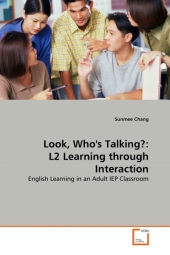 Neuerscheinungen 2010Stand: 2020-01-07 |
Schnellsuche
ISBN/Stichwort/Autor
|
Herderstra▀e 10
10625 Berlin
Tel.: 030 315 714 16
Fax 030 315 714 14
info@buchspektrum.de |

Sunmee Chang
Look, Who┤s Talking?: L2 Learning through Interaction
English Learning in an Adult IEP Classroom
2010. 176 S.
Verlag/Jahr: VDM VERLAG DR. M▄LLER 2010
ISBN: 3-639-30522-1 (3639305221)
Neue ISBN: 978-3-639-30522-7 (9783639305227)
Preis und Lieferzeit: Bitte klicken
With the emphasis on the classroom as one of the most important places where language learning occurs, the study presented in this dissertation looked at classroom interaction occurring in a class of adult ESL learners in a university-based intensive English language program (IEP). The study is based on the sociocultural perspective of language and learning, which views language learning as a process of socialization into competent participation in socioculturally significant language practices. The results showed that the major turn-taking interaction pattern was Initiation- Response-Follow up (IRF) and the students differently responded according to the types of teacher┤s utterances. Since few studies of adult L2 learning have focused on interaction in the classroom from a sociocultural perspective, and even less on IEP, this study will contribute to the L2 learning literature by examining interaction in adult classroom in terms of getting at the micro details of what teachers consider exemplary. This study will also help ESL practitioners have more specific ideas (strategies) about how to guide culturally diverse adult ESL students in the classroom.
Sunmee Chang got her Ph.D. in Language Education(TESOL) from The University of Georgia. Currently, she is a professor at Hoseo University in Korea. Her interest is L2 learning in the classroom through interaction among participants and teacher education. Her research is qualitative-oriented and usually adopts discourse analysis.


